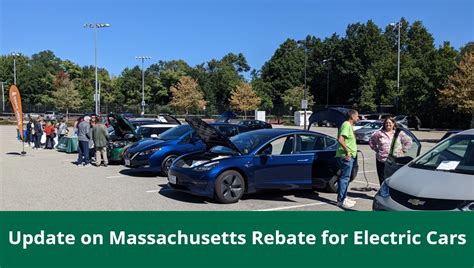Driving Change: How Massachusetts’ Electric Car Rebate Program is Boosting EV Adoption
The shift toward electric vehicles (EVs) represents one of the most significant trends in the automotive industry today. As the world grapples with climate change and the need for sustainable solutions, states like Massachusetts are taking proactive steps to encourage the adoption of electric vehicles. Central to this effort is the Massachusetts Electric Vehicle Incentive Program (MassEVIP), a rebate program designed to lower the costs associated with purchasing electric cars. This article explores how the program is boosting EV adoption in Massachusetts, its benefits, challenges, and what the future may hold for electric vehicles in the state.
The Massachusetts Electric Vehicle Incentive Program
Launched in 2014, the MassEVIP aims to incentivize residents and businesses to switch to electric vehicles. The program provides rebates to customers who purchase or lease eligible electric vehicles, including fully battery-electric vehicles (BEVs) and plug-in hybrid electric vehicles (PHEVs). The rebate amounts vary based on the type of vehicle and its battery capacity, making it financially appealing for consumers to consider going electric.
Incentives Driving Adoption
The primary objective of the MassEVIP is to reduce the upfront financial burden of purchasing electric vehicles. With an initial cost that can be higher than conventional vehicles, many potential buyers are deterred from making the switch. By providing substantial rebates—ranging from $2,500 to $5,000, depending on the specific vehicle—the program alleviates some of these cost concerns.
Moreover, the program aligns with the state’s broader environmental goals. Massachusetts aims to achieve net-zero greenhouse gas emissions by 2050. Transitioning to electric vehicles is seen as a crucial component of this strategy, as transportation accounts for a significant percentage of the state’s emissions. By facilitating EV adoption through financial incentives, Massachusetts is not only making electric vehicles more accessible but also driving forward its environmental agenda.
Impact on EV Adoption Rates
Since the launch of the MassEVIP, there has been a marked increase in electric vehicle registrations in the state. According to the Massachusetts Department of Energy Resources, the number of registered electric vehicles has risen dramatically—by over 200% in recent years. This surge can be attributed to various factors, including improved vehicle technology, greater public awareness, and the financial incentives provided under the MassEVIP.
The availability of charging infrastructure has also played a critical role. The state has invested in expanding charging stations, thereby addressing range anxiety among potential EV buyers. This combination of financial incentives and improved infrastructure makes purchasing electric vehicles a more viable option for many residents.
Challenges of the Program
While the MassEVIP has significantly boosted EV auto adoption, challenges remain. One of the primary concerns is funding; as demand for rebates continues to grow, the available budget may not be sufficient to meet this demand. This shortfall could lead to delays in processing rebates or the need for program cuts, which would impact future EV sales.
Additionally, there is a gap in access to EVs in more rural areas compared to urban centers. Many of the EV models eligible for rebates may not be as accessible to residents in remote regions, thereby limiting the program’s effectiveness. It’s important for the state to address these disparities to ensure equitable access to electric vehicle options for all Massachusetts residents.
The Future of EV Adoption in Massachusetts
Looking ahead, the future of electric vehicle adoption in Massachusetts appears promising. With continued government support, technological advancements, and an increased emphasis on environmental sustainability, the demand for electric vehicles is expected to grow. The Massachusetts government not only plans to maintain the electric vehicle rebate programs but may also look to enhance them by offering additional incentives, such as tax breaks or expanded leasing programs.
Moreover, as automakers continue to expand their electric vehicle offerings, consumers will have more options to choose from, making the transition to electric vehicles even more appealing. It’s anticipated that the development of innovative vehicle models and battery technologies will further boost consumer confidence and acceptance of electric vehicles.
Conclusion
Massachusetts’ Electric Vehicle Incentive Program is a powerful tool in promoting the adoption of electric vehicles, making them more financially accessible and aligned with the state’s environmental goals. By lowering the upfront costs and addressing challenges like charging infrastructure, the program has significantly boosted EV adoption rates. However, continuous evaluation and adaptation of the program are essential to ensure its sustainability and reach across all communities. As Massachusetts drives toward a more sustainable future, the electric vehicle rebate program could serve as a model for other states looking to embark on similar initiatives.
FAQs
1. What is the Massachusetts Electric Vehicle Incentive Program?
The Massachusetts Electric Vehicle Incentive Program (MassEVIP) provides rebates to residents and businesses who purchase or lease eligible electric vehicles. The program aims to reduce the cost barrier associated with transitioning to electric vehicles.
2. How much can I get from the rebate program?
Rebate amounts vary based on the type of vehicle and its battery capacity, typically ranging from $2,500 to $5,000 for eligible vehicles.
3. Are all electric vehicles eligible for the rebate?
No, only certain fully battery-electric vehicles (BEVs) and plug-in hybrid electric vehicles (PHEVs) qualify for the rebates under the MassEVIP program.
4. How does the program address charging infrastructure?
The state has actively invested in expanding charging stations to alleviate range anxiety, which is crucial for encouraging more individuals to switch to electric vehicles.
5. What challenges does the program face?
Key challenges include potential funding shortfalls as demand for rebates grows and disparities in access to electric vehicles in rural versus urban areas.
Download Massachusetts Electric Car Rebate
